H. James Shea Jr.
Herman James "Jim" Shea Jr. (December 10, 1939 – May 9, 1970) was an American politician from the state of Massachusetts. A resident of Newton for most of his life, he graduated from Tufts University and, after dropping out of the University of Virginia School of Law, found employment as a civil engineer, real estate broker, and university instructor. A progressive member of the Democratic Party, he served on the Newton Board of Aldermen as well as in the Massachusetts House of Representatives.
Jim Shea | |
|---|---|
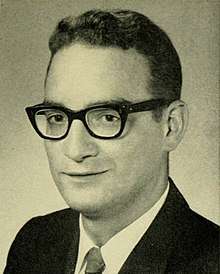 | |
| Member of the Massachusetts House of Representatives from the 12th Middlesex district | |
| In office January 8, 1969 – May 9, 1970 | |
| Preceded by | Felix Perrault |
| Succeeded by | Paul Guzzi |
| Personal details | |
| Born | Herman James Shea Jr. December 10, 1939 Boston, Massachusetts, U.S. |
| Died | May 9, 1970 (aged 30) Newton, Massachusetts, U.S. |
| Political party | Democratic |
| Spouse(s) | Anita Vesta McDonald ( m. 1967–1970) |
| Alma mater | Tufts University (AB) |
| Signature |  |
From his election to the House in 1968, freshman legislator Shea engaged in activism against the Vietnam War and supported the burgeoning modern environmental movement. A bill he sponsored, which later bore his name, exempted Massachusetts residents from being conscripted into federal service in undeclared foreign conflicts. While it passed the legislature and was signed into law by Governor Francis Sargent, the Supreme Court in Massachusetts v. Laird declined to hear the state's challenge the war's constitutionality.
Already feeling overworked soon after he entered the legislature, Shea was frequently asked to speak and floated as a candidate for higher office. Succumbing to what his wife described as "political pressures," he committed suicide by gunshot at the age of 30.
Early life and family
Childhood and education
Shea was born on December 10, 1939 in Boston, Massachusetts, the first of three sons of Eileen (née Curtin; 1911–2002) and Herman James Shea Sr. (1911–1998).[1][2][3] His father was a civil engineer and member of the faculty at the Massachusetts Institute of Technology.[4][5]
He grew up in Newton and attended public schools there, including Newton High School, from which he graduated in 1957.[6][7][8] He then went on to Tufts University, where he earned a degree in political science, with a minor in economics; he attended the University of Virginia School of Law, following this, but left after completing 34 credit hours.[9][1] Before devoting himself to politics full-time, he was employed as civil engineer and real estate broker.[10] He also completed graduate work and served as a teaching assistant in political science at Northeastern University.[2][1]
Marriage
In 1967, Shea married the former Anita Vesta McDonald, an instructor at Salem State College, at Saint Mary's Catholic Church in Plainfield, New Jersey. The couple settled in Newton after a honeymoon through New England and Canada.[11]
Political career
Local politics
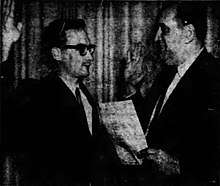
Shea first ran for an at-large seat on the Newton Board of Aldermen in 1963.[10] In a race for two spots from Ward 7, he ran on a progressive platform that included providing public records of board attendance and activities.[12][13] He placed a distant fourth among the candidates.[14]
In 1965, he ran again, this time for the Ward 7 seat being vacated by incumbent William Carmen, and initially came in 8 votes behind Boston University professor Harry H. Crosby.[15] After a recount, Shea was given 961 votes to Crosby's 958 and was declared winner.[16]
State politics and anti-war activism
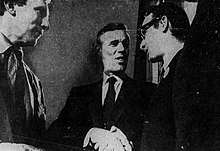
He was opposed to the Vietnam War, and he drafted a bill challenging its constitutionality, thus enabling Massachusetts residents to ignore the draft.[17][18][19][20]
Death and funeral
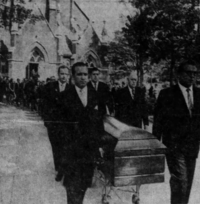
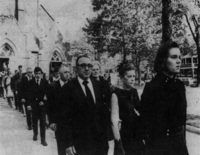
On May 8, 1970, Shea and his wife went to the home of John M. McDonnell, a Newton alderman and friend, where they spent the evening socializing. Upon returning to their residence on Princess Road in West Newton, Shea committed suicide by gunshot in front of his wife at approximately 12:30 the following morning. He had reportedly been under "political pressure" at the time.[18][19][21] After Shea's wife phoned McDonnell, who called the police, Shea was transported to Newton-Wellesley Hospital, where he was declared dead on arrival at 12:55.
Attendees at the funeral included U.S. Senator Ted Kennedy, Congressman Philip J. Philbin, and Massachusetts Attorney General Robert H. Quinn.[22][23]
Legacy
Businessman Robert Kraft was elected chairman of the Newton City Democratic Committee in 1968. The death of Shea, a friend, deterred Kraft from further pursuing a career in politics, including a 1970 congressional run.[24]
References
- Public Officers of the Commonwealth of Massachusetts. Commonwealth of Massachusetts. 1969. p. 289. Retrieved February 5, 2020.
- "Shea was to seek state office". The Boston Globe. May 10, 1970. p. 13. Retrieved February 12, 2020.
- "Herman James "Jim" Shea, Jr (1939-1970)". Find A Grave. Retrieved February 12, 2020.
- "Eileen Curtin to Wed H. J. Shea of Brighton". The Boston Globe. May 1, 1936. p. 34. Retrieved February 5, 2020 – via Newspapers.com.
- "Faculty Appointments Announced at M. I. T." The Boston Globe. January 21, 1936. p. 15. Retrieved February 8, 2020 – via Newspapers.com.
- 1957 Newtonian. Stamford: T. O'Toole and Sons. 1957. p. 72.
- "732 Presented Diplomas At Newton High Exercises". The Boston Globe. June 11, 1957. p. 14. Retrieved February 4, 2020 – via Newspapers.com.
- Keene, Evelyn (August 19, 1968). "Dilapidated Newton School Produces Top Scholars". The Boston Globe. p. 6. Retrieved February 4, 2020 – via Newspapers.com.
- "12th Middlesex". The Boston Globe. October 22, 1968. p. 75. Retrieved February 4, 2020 – via Newspapers.com.
- "Ward 6 Post As Alderman Is Shea Aim". The Newton Graphic. September 19, 1963. p. 3. Retrieved February 9, 2020.
- "Anita McDonald Weds Mr. Shea". The Boston Globe. July 2, 1967. p. 53. Retrieved February 5, 2020 – via Newspapers.com.
- "Election". The Newton Graphic. October 24, 1963. p. 10. Retrieved February 24, 2020.
- "Shea Attacks 2 Opponents on Attendance". The Newton Graphic. October 31, 1963. p. 23. Retrieved February 24, 2020.
- "Aldermen". The Boston Globe. November 6, 1963. p. 17. Retrieved February 24, 2020 – via Newspapers.com.
- "Basbas Captures Mayoralty; B.U. Educator Victor by 8". The Boston Globe. November 3, 1965. p. 7. Retrieved February 8, 2020 – via Newspapers.com.
- "B.U. Prof Upset By Shea in Newton Retally". The Boston Globe. November 17, 1965. p. 31. Retrieved February 9, 2020.
- "Sponsor of Massachusetts Bill To Test War Dies of Gun Injury". The New York Times. May 10, 1970. p. 32. Retrieved February 18, 2020.
- "War Protester Solon Commits Suicide". Colorado Springs Gazette-Telegraph. May 11, 1970. p. 1-C. Retrieved February 7, 2016 – via Newspapers.com.
- "Milestones: May 18, 1970". Time. May 18, 1970. Retrieved February 7, 2016.
- Turner, Robert L. (April 1, 1980). "Ten years later: A bill to remember". The Boston Globe. p. 15. Retrieved April 15, 2020 – via Newspapers.com.
- "Rep. Shea Takes His Own Life, Drafted Bay State Antiwar Law". Bennington Banner. May 11, 1970. p. 5. Retrieved February 7, 2016 – via Newspapers.com.
- "Civic, political leaders at Shea rites". The Boston Globe. May 11, 1970. p. 35. Retrieved February 1, 2020 – via Newspapers.com.
- "More than 1000 attend Shea rites". The Boston Globe. May 12, 1970. p. 41. Retrieved February 1, 2020 – via Newspapers.com.
- Kindleberger, Richard (December 19, 1993). "The family ties that bind pull at the man who would purchase the Patriots". The Boston Globe. p. A4 – via Newspapers.com.